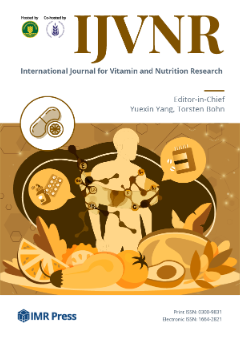International Journal for Vitamin and Nutrition Research (IJVNR) is published by IMR Press from Volume 95 Issue 1 (2025). Previous articles were published by another publisher under a hybrid publishing model, and they are hosted by IMR Press on imrpress.com as a courtesy and upon agreement with Hogrefe.
Improving vitamin D status in bariatric surgery subjects with monthly high-dose ergocalciferol A randomized clinical trial
Background: Vitamin D insufficiency is common before and after bariatric surgery. Optimal supplementation to treat vitamin D insufficiency is not clearly defined. Objective: Determine if serum 25 (OH) D levels improve by the consumption of an additional monthly ergocalciferol supplement by subjects after bariatric surgery. Study design: Thirty-two subjects were randomly divided to receive an additional 100,000 IUs of ergocalciferol monthly after bariatric surgery (n=10) or standard level vitamin D supplement after bariatric surgery (n=22). Serum 25 (OH) D, calcium, and hemoglobin A1c levels were measured preoperatively and one year after bariatric surgery. Results: Mean changes in BMI at 1-year post-operation was −18.12±6.46 kg/m2 in the control group versus −18.84±4.7 kg/m2; p=0.638 in the vitamin D group. One year after bariatric surgery, the mean changes from baseline in vitamin D levels were 2.69±9.4 and 12.4±17.0 ng/mL in control and intervention groups, respectively. The treated group showed a marginally higher mean increase in Vitamin D than the control group, p=0.059. Other mean changes at 1-year post-surgery that were not significantly different include calcium −0.264±0.45 and −0.21±0.509 mg/dl in control and intervention groups, respectively and HbA1c −1.0±1.21 and −0.95±0.071% in control and intervention groups, respectively. Conclusion: This study showed 100,000 IUs ergocalciferol once a month is a safe and effective treatment for vitamin D insufficiency in most patients having bariatric surgery.

